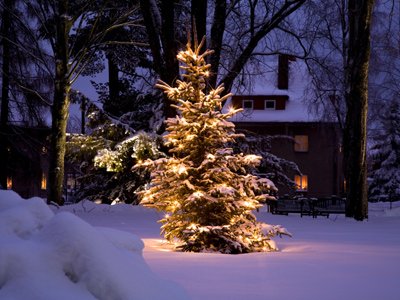
Ask the AI Tutor
Need help with Temperate Forests? Ask our AI Tutor!
AI Tutor - Lucy
Connecting with Tutor...
Please wait while we establish connection

Conifers have become symbolic of life in the cold winter as the Christmas tree.
Temperate Forests
This GCSE Geography quiz explores temperate forests, where changing seasons, rich soils, and broadleaf trees create habitats with high biodiversity and important resources for people.
1 .
Broadleaf trees have large leaves that have adapted to absorb the maximum amount of sunlight possible. This large size means that they are vulnerable to winter winds and freezing conditions. Some broadleaf trees lose their leaves in the winter. What is this type of forest known as?
Coniferous
Deciduous
Adaptive
Successional
Deciduous trees take back the nutrients from their leaves each autumn, turning them brown. The leaves are then lost to form a deep leaf litter on the forest floor
2 .
What type of tree dominates in coniferous forests?
Conifers
Broadleaf
Deciduous
Oak
Coniferous forests often grow in areas where the conditions and climate are too extreme for broadleaf
3 .
In terms of forest management, what is coppicing?
Allowing trees to grow wild to form wildlife zones
Young trees are cut down nearly to ground level to allow multiple shoots to regrow in subsequent years
Growing single trees and removing the branches to form tall straight trunks
Logging single trees from within the forest to allow better growth of other trees. Removal often occurs using horses to minimise damage to trees surrounding the trees that are removed
Coppicing is a traditional technique that has been undertaken in British forests for thousands of years
4 .
Why are coniferous forests described as being evergreen?
The bark and branches are green so once they lose their leaves they still seem to be green
Their leaves don't go through a brown phase each autumn but stay green until they fall off each winter
Their small needle-like leaves are resistant to cold winters and so don’t need to be shed each winter
They are traditionally brought inside as a Christmas tree so stay green all year round
Because conifers stay green all year round they can photosynthesise even during the winter. Because of this they symbolise rebirth and life in the middle of winter, leading to their use as the Christmas tree
5 .
Which of the following is not a way that coniferous trees are adapted to the conditions of winters?
Thick bark to protect themselves against the cold
Pine cones to protect the seeds during the winter
Broad leaves to absorb the maximum amount of sunlight
Dense forests to create warmth during the winter
Coniferous trees have small, thin needles and are green even in winter so can photosynthesise all year round
6 .
Why are mosses predominantly found on the forest floor and tree branches of temperate forests?
The strong levels of light allow the mosses to grow
Mosses feed on the sap of trees and need cold dry conditions
Mosses have a parasitic relationship with trees
The low light conditions and damp atmosphere mean there is little else to compete with the mosses
It's often said that mosses will grow on the north side of trees. This is because, in the Northern Hemisphere at least, conditions are cooler and damper on the north side of trees
7 .
Plant or ecological succession is the process from exposed ground through to a final established forest. In terms of succession what stage follows a mature forest?
Emergent forest or community
Defined forest or community
Climax forest or community
Successional forest or community
A climax community is the peak that an ecosystem can reach. Often they can't reach that point as fires and other destructive forces will knock back the succession to the start
8 .
Mediterranean forests include a special type of vegetative ecosystem known as Mediterranean scrublands. Whilst these are normally not large enough to be considered true forests they do include small oaks and pines. What is one of the main threats facing Mediterranean scrubland?
Overgrazing by sheep and goats
Forest fires
Drought
Flooding
Sheep and goats will graze on any and all vegetation, reducing areas to desert rather rapidly
9 .
What is a pioneer species?
The first species to colonise a previously disturbed or disrupted ecosystem, beginning the chain of succession
The final species to finish off a chain of succession
A species that takes root on a beach or coastline
The species that carries on after an emergent species has taken hold after a fire or other clearance
Pioneer species allow the chain of succesion to begin. Dependant on the situation, various species may become pioneer species
10 .
If a forest contains spruces, hemlock, pines and fir trees what type of forest is it?
Coniferous
Mixed
Broadleaf
Deciduous
Even though they look similar, coniferous forests have a variety of trees. This sort of biome is also known as a taiga
**Unlimited Quizzes Await You! 🚀**
Hey there, quiz champ! 🌟 You've already tackled today's free questions.
Ready for more?
Ready for more?
🔓 Unlock UNLIMITED Quizzes and challenge yourself every day. But that's
not all...
not all...
🔥 As a Subscriber you can join our thrilling "Daily Streak" against other
quizzers. Try to win a coveted spot on our Hall of Fame Page.
quizzers. Try to win a coveted spot on our Hall of Fame Page.
Don't miss out! Join us now and keep the fun rolling. 🎉
**Unlimited Quizzes Await You! 🚀**
Hey there, quiz champ! 🌟 You've already tackled today's free questions. Ready for more?
🔓 Unlock UNLIMITED Quizzes and challenge yourself every day. But that's not all...
🔥 As a Subscriber you can join our thrilling "Daily Streak" against other quizzers. Try to win a coveted spot on our Hall of Fame Page.
Don't miss out! Join us now and keep the fun rolling. 🎉






